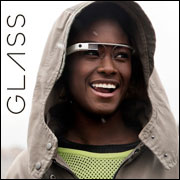
There’s plenty to lust after in Google Glass — if you’re a tech aficionado, that is. A beta version of Google’s widely hyped, Web-connected eyewear has been out for a few weeks, and rave reviews have been the rule rather than the exception.
Tech evangelist Robert Scoble, for instance, swears he will never take them off — and to prove his point he recently posted a photo of himself wearing Google Glass in the shower.
Meanwhile, developers are building Google Glass apps to tempt and titillate, including recently released example Winky, which lets a Google Glass wearer take a photo with the blink of an eye.
What about mainstream adoption, though? Is Google Glass really destined for greatness, as its early adopters proclaim? Or is it heading for that special place in the tech industry’s graveyard for gadgets that were released before their time?
At this early stage, it’s a coin toss at best.
Shipments of smart glasses in general could reach 9.4 million units by 2016, research firm IHS predicted.
However, if growing negative sentiment is any indication, Google clearly has much to do before it can claim any widespread success for this latest venture.
‘Google Can’t Quite Deliver’
Featuring a video camera with 720p resolution and 16 GB of onboard flash storage, Google Glass allows wearers to record everything they see, as well as interact with the Internet via natural language voice commands.
The idea may be likeable on an abstract level, but there’s plenty to dislike in its current implementation, starting with the product’s dorky appearance on most users.
The US$1,500 price, meanwhile, will clearly be out of reach for most consumers. Then there’s the privacy issue: Using Google Glass, people can surreptitiously take photos of their surroundings and post them to social media.
Google may not be able to win, no matter what it does with Google Glass. Consumers want tech and computing advancements to continue, but as Google tries to meet that demand with Google Glass, it’s falling short in other areas, Mike Plugh, a communications professor at Fordham University, told TechNewsWorld.
“On the one hand, the public wants the interface to be transparent, but Glass doesn’t completely deliver,” Plugh explained. “The expectation of transparency exceeds the reality, so while there’s great enthusiasm, Google can’t quite deliver.”
Usability issues “trump the cool factor, especially when tablet technologies are still relatively new and capturing the consumer imagination,” he added.
A Downwardly Adjusting Price
As for the price point, that’s currently a nonstarter for most consumers, but it’s widely expected to come down, Ari Zoldan, CEO of Quantum Networks, told TechNewsWorld.
New technology is always expensive at first, he noted, pointing to the original plasma TVs as one example. At $1,500, this first batch of Google Glass is meant for developers, as a way to gain experience and learn how to implement their ideas.
“The price will fall, given the laws of supply and demand,” Zoldan said. “Currently, Glass is in the early adopter phase, and this phase allows for people to pay a premium price to obtain a product sooner than others would be able to.”
The cool factor, however, might take longer to address.
A Matter of Time
“When Nissan redesigned the Nissan Altima in the mid- to late 2000s, it looked a lot better,” Zoldan pointed out. “Still, more changes had to be conceived to give the vehicle that cool feel.”
Now, “this is the same with the Glass, or any other new tech, for that matter,” he explained. “Primarily, the goal is to have functionality remain the same while aesthetics take a hit, until the functionality has been formed. Then the implementation of more hip glasses can begin.”
The privacy issue will also take some time to resolve, Zoldan added, although in this case the public appears ready to seize control of the debate. To wit: A handful of drinking establishments and other public places have already put in place policies banning Google Glass.




















































